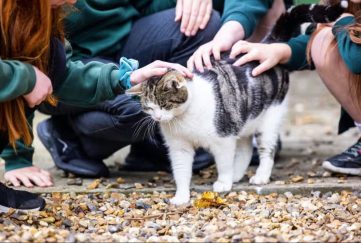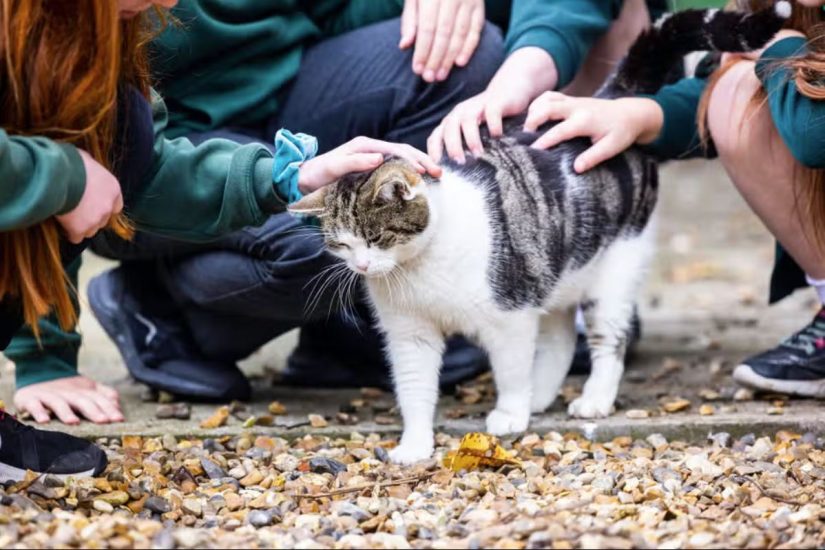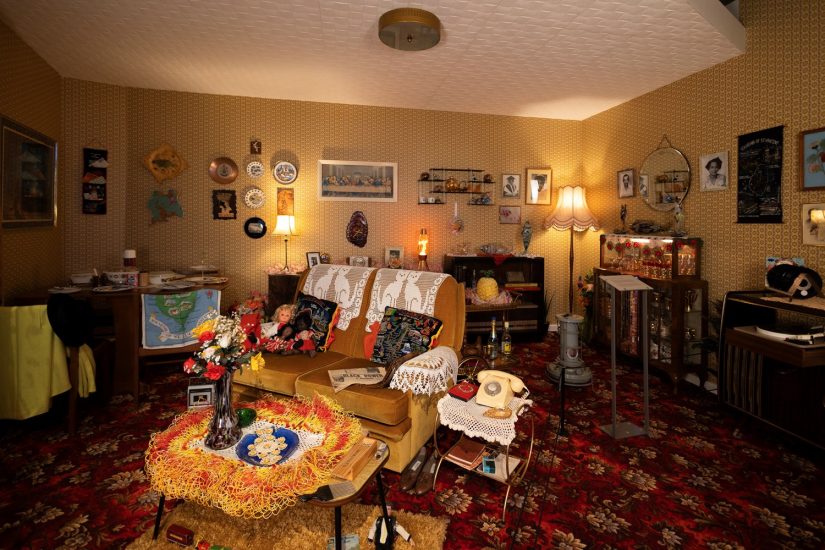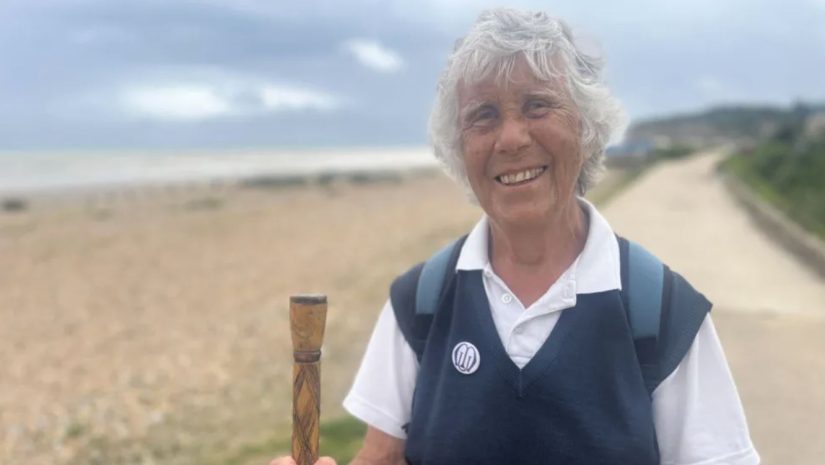“Susie, The Flower Girl” By Ethel Edwards
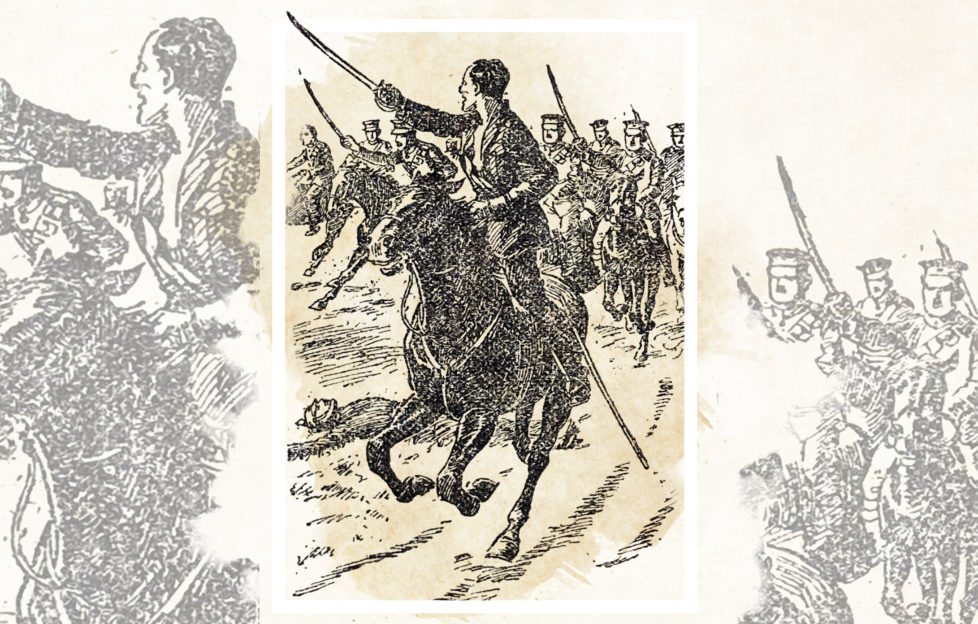
This story was first published in a January 1915 issue of “The People’s Friend”.
It was subtitled “A Romance Of The War”, and reflected the magazine’s desire to engage with contemporary events — and to not shy away from difficult subjects.
A trembling hand, a quick drawn breath express as much of more than the most eloquent language.
And when the two were parting at the entrance to the court where Susie lived, Joe realised that his opportunity had come.
“Susie,” he said, “I love you. Don’t you think you’d better hang on to me altogether. What’s to hinder us two bein’ married?”
“Oh, Joe,” she leaned against the wall, her breath coming in quick, short gasps. “How can we? What about little Herbert?”
“What’s the hindrance there; my trade’ll keep the three of us. Don’t you care about bein’ married to me?”
“It isn’t that, Joe; I love you — indeed I do. But it doesn’t seem fair to you. There’s little Herbert to keep. No, I can’t marry you,” she repeated, but her red mouth drooped and Joe thought how delicious and tempting her lips looked.
The colour flowed into her cheeks, her blue eyes were startled and she smoothed the skirt of her “best” frock, a well-worn blue serge, with a hand that trembled a little.
“I never saw such a girl,” and his arm pressed her closer to him. “Say you will, Susie.”
“Oh, Joe!” but her eyes fell before his and he kissed away further protests.
“I’ll have to go, Joe,” she whispered at last, drawing herself from his close embrace. “And Joe, are you going to the Mission tomorrow? Are you studying the books Mrs Brown gave you?”
“Me, studying?” Joe asked helplessly; the idea was staggering.
“You ought to — I’m studying,” she said earnestly. “Mrs Brown says orphans ought to make the most of their opportunities. You see, somehow or other, they always get a bad start unless they’re rich, so they’ve got to make up for lost time.
“Just the way it was with you and me, you know.”
“Yes, I know.” said Joe, “and I’ll see you tomorrow, and Susie — you’ll remember now you are promised to me.”
“Yes, Joe, dear,” and she kissed him of her own accord.
And Joe, cap in hand, wistfully watched her dainty figure with her modish little hat with its blue cornflowers that almost matched her eyes, as she tripped down the court.
She called out greetings to the groups of slatternly women and ill-favoured men at alley corners as she passed, and received their nods of recognition, some stopping their muttered conversation to speak to her, for all had a good word to say for Susie.
She stopped at the end house of the court and let herself in. A figure seated by the window stirred.
“That you, Susie?”
“Yes, Herbert, dear,” she answered. Throwing her hat on the bed and taking the outstretched hand she sat down beside him. The boy’s pinched face with its closed, sightless eyes was turned up to her. He was only six.
“Out walking with Joe Somers,” and she smiled dreamily as she stroked his hair.
She made a sweet picture sitting there, her worn serge, with its spotless lawn frills at the wrists and open throat, showing off her pretty pale complexion and her fair, curly hair bound in soft waves round her graceful head.
Only a flower girl, yet she looked as fair and sweet as the roses she sold in the streets.
“With Joe,” the tired old voice grew wistful; “Susie,” he said, then stopped.
“Yes, Herbert?”
“Susie, will you and Joe ever get spliced?”
“Spliced! Oh, Herbert, what a word to use; but,” and she laughed softly, “he asked me tonight.”
His hand clutched hers nervously.
“What is it, Herbert?” she asked anxiously.
“Susie,” and his voice broke, “when you marry Joe, you won’t leave me, will you?”
“Leave you? Oh! Herbert,” and she wound her arms round his small figure. “You know you will always go with Susie wherever she goes.”
He sighed a great sight of relief.
“I knew it, Susie, but I just wanted to hear you say it.”
She laughed happily.
“You know I’ll always love you most. But guess what I’ve brought for your supper.”
“Whelks?” he asked eagerly.
“No, you are always after whelks.”
“Tarts?”
“No.”
“Susie,” his voice held a sudden rush of eagerness. “Not — not a custard pie?”
“Yes,” she drew forth from its paper bag a round of rather greasy-looking pastry. “I had a stoke of luck today; a lady gave me a shilling for a bunch, so I got you one.”
His little face was beaming when he had finished.
“Custard pie is the best thing out, Susie,” he said as she helped him to undress.
***
Every morning Susie began her duties early.
Away she went to market for the perishable blooms that often were proffered and vainly hawked throughout the day.
Lately business has been fairly brisk, but for days Susie had been uneasy. With the quick intuition of the street she read the shadow of impending war on the newsboy’s bills.
And that night like a thunderclap burst, the proclamation that war was declared between Britain and Germany.
Newsboys raked in their harvests as they dashed past, dispersing “specials”. But flower girls, such as Susie, returned home with aching hearts and feet, and spirits as crushed and drooping as their unsaleable wares.
Susie was beginning to feel the pinch. Flowers weren’t selling, and she and Herbert were having to economise more even more than before.
Susie hadn’t seen Joe for a day or two. He was a packer in a postcard factory, and as she knew theirs was almost entirely a Continental trade, she was frightened.
Already there were rumours of workers being suspended indefinitely. The country was calling for me.
Kitchener had issued the challenge. “Your King and Country Need You,” met Susie at every hoarding, and her heart sank. What would she do if Joe had to go?
“Susie,” whispered Herbert’s voice from the bed one morning as she prepared to leave, “how many days is it since we had a custard pie?”
“I don’t know, Herbert. Last week, wasn’t it?”
She remembered with sudden pain that she hadn’t seen Joe since then. Another awful thought assailed her\; the rent hadn’t been paid for a week, and everybody knew what a brute Dowsett was. He wouldn’t hesitate to fling a household out into the night and the street and gloat over their misery.
She dashed the tears from her eyes. For the first time in her seventeen years’ experience of poverty and degradation she felt really frightened.
Her mother’s death the year before had made everything so much harder for Susie. Her father had been killed some years before in a street accident, but he had been nothing but a drunken brute who had lived solely to break up that home which it had been the mother’s life work to keep up.
So no wonder the responsibility of looking after her six-year-old blind little brother and keeping the home together weighted pretty heavily on her at times.
“I won’t be long in being back, Herbert,” she said, quite cheerfully opening the door.
“Right you are, Susie,” he called, and she slipped out into the yard and hurried past the groups of ragged men and women who stood eagerly discussing the latest war news.
All day Susie hawked her wares — little nosegays, tastefully bunched, red, white and blue — but there was little or no sale. The hurrying crowds had other things than the buying of flowers to think of, and Susie’s heart sank within her as she counted her meagre returns.
She gave it up late in the afternoon, when a chilling rain began to fall, and turned her steps homewards.
She felt utterly hopeless at the thought of the fireless home and the empty cupboard.
And the thought of brave little Herbert feeling the cravings of hunger agonised the sister-mother now powerless to satisfy it.
She dragged her way down the court. Suddenly her heart nearly stood still with horror. There was a crowd round her door, amongst them Dowsett, the broker’s man.
Racing forward, she flung herself at him as he was beginning unceremoniously to pile the “sticks” on the barrow at the door.
“Oh, Mr Dowsett — Mr Dowsett. You aren’t going to take out sticks. You won’t be so cruel. You wouldn’t send out little Herbert and me with nowhere to lay our heads.
“Oh dear! What shall I do? What shall I do?”
And she flung her arms round poor little Herbert, who had risen at the sound of her voice from the step where he had been dumped by the broker’s man.
“Stow it,” growled Dowsett, “if yer can’t pay, out ye must go.”
“There’s only one week owing, and with a bit of luck at Covent Garden in the morning I might scrape the money together by tomorrow night.”
“Cawn’t ‘elp that. If yer ain’t got the money yer got to go,” he repeated roughly.
“But can’t you wait?”
“No!” he snarled, “and stow it, do.”
“That’ll do, Bill Dowsett,” said a quiet voice from the back of the crowd, and some one came pushing forward.
“Joe!” Susie sobbed out her relief.
“All right, old girl,” and he slipped his arm round her. “Now, Bill Dowsett, just you put these things where you found them and hurry up.”
“Wot call ‘ave you to interfere?”
“Just this,” and he shoved the money under Dowsett’s nose; “so get busy.”
“Oh! Joe,” sobbed Susie, ” what a mercy you came. He came here when I was out.”
“Blooming skunk!” growled Joe.
Dowsett carried back the last of the things.
“‘Old on, mate, there’s no call to chuck me names. ‘Ow was I to know you was to pay the lady’s rent?” And with a leer he trundled away his barrow, taking the crowd and the atmosphere of stale beer with him.
“Susie, I’ve been paid off.”
“Paid off! Oh, Joe!”
“Yes, and I’ve been looking for a crib for days.”
“Is that why I haven’t seen you? But, Joe, what are you going to do?”
“Susie,” he said tersely, “I’ve ‘listed.”
“Joe, oh Joe!” Her voice was full of pain.
“Yes,” he said hoarsely, “so this is goodbye, Susie; but you’ll never forget me.”
“Joe, I’ll never forget you.”
He kissed her tenderly, and pressed something into her hand. “That’s your share of the King’s Bounty,” he whispered, and releasing her gently turned and sped down the court.
She leaned against the wall, half-dazed, watching him till he turned the corner. Then a little hand plucking uneasily at her skirt brought her to a sudden consciousness of her loss, and gathering up little Herbert in her arms, she crushed him to her breast, and fled sobbing into the house.
“Oh, Joe, come back to me!” she sobbed.
“Susie, don’t take on so,” whimpered the little man, stroking her hair. “He’ll come back to us, sure.”
But presently the storm of grief abated and she rose and went over to the dresser that had been so narrowly rescued from the broker’s man, and took therefrom a little tin canister.
And into it one by one she dropped the King’s Bounty and kissed each piece of silver as it fell.
***
The attack was a complete surprise, and at the first roll of German Artillery the wearied troopers sprang from beside their horses, where they had thrown themselves a few hours before, to find they were completely outflanked by the enemy.
But perfect discipline prevailed; with marvellous swiftness and precision they harnessed and got under arms. They were a small company of cavalry. about two hundred strong, without artillery — only a forward branch of the main body.
Amongst them was Joe, the postcard factory packer, but what a different Joe! Weeks of hard training and hard riding had tanned and browned him, and his knees securely gripped his horse’s heaving flanks.
As in the case of many others of that small company this was his baptism of fire; but — and his chin squared — he was ready for anything — aye, death itself!
The bullets whistled nearer. One man lurched in his saddle and fell. A revulsion of feeling ran through Joe, and he gripped his bridle till his knuckles showed white.
But a few whispered orders were passed round and the officer in command rose in his stirrups.
“Now, men!” he shouted. “Ready — forward — charge!”
And with deafening hurrahs and brandishing swords they thundered after him.
Through the German lines they crashed, cutting and hacking their way, each man determined to sell his life dearly in that fight against overwhelming odds — each man vowing to die game.
Fast as they mowed the Germans down, others rose in their places, and in the midst of it rode Joe, shouting and slashing, his face set in the warrior’s lust.
But one by one the officers, singled out by the Germans, throwing themselves into the deadliest of the carnage, with the impetuous self-devotion of their service, were shot down till only one remained.
And with only a handful of that brilliant squadron that had galloped through and through those German lines, he turned them for another charge — the last remaining officer, his head uncovered, his coat torn, his chest bare, his face and hands like theirs, black with smoke and powder.
Waving his dripping sword above his head till the rays of the rising sun caught it afresh, “Charge, men! Charge!” he yelled. And every sabre answered his; straight over the masses of lifeless forms, and almost suffocated with dust and dirt, they galloped.
The effect was superb. For a moment the German lines gave way, but closed again, and the cavalry paid the awful toll, and fell down black, huddled, stiffened heaps of dead men and beasts.
Joe, fighting for life, was just behind the officer, who looked round.
“Come, lads,” he yelled, and as he turned a German sabre flashed, but as it lunged, Joe almost threw himself from his horse and parried the stroke by sheathing it in his own breast.
With a cry of horror and admiration the officer caught him as he fell and swung him over his saddle, and at that moment came the rattle of distant musketry, and the hurrahs of on-coming cavalry, as they dashed up and scattered like chaff the German lines.
***
For the first time in what seemed like weeks of shadowed nightmare, of strange phantom figures and faces, Joe opened his conscious eyes to look up from an English four-poster into a pair of familiar blue eyes welling over with tears. A lump rose in his throat, and it seemed ages before he gulped out, “Sue”.
“Oh! Joe,” and in a moment both her arms were round him. “I thought I’d never hear you say it again.”
“But where are we, Sue,” he asked as soon as he could speak.
“Why, we’re in Lady Denby’s. It was her son you saved, and he had you invalided home here, and she found my address, I really don’t know how, and came and brought me and little Herbert here, after I had thought I should never see you again,” and she sobbed afresh.
“Don’t take on so, Susie,” and even though it hurt to move, Joe stroked her hair.
“Before I go back, we’ll get spliced this time.”
“Go back? Oh, Joe!”
“Susie! Susie! you wouldn’t keep me here when all the other fellows are fighting. But we’ll get married, Susie dear, and when I come back –”
“And when you come back, Susie and you will, I hope, never find a truer friend than the mother whose son’s life you saved almost at the cost of your own,” and from the doorway Lady Denby smiled at them.
“Oh, Joe, my hero,” sobbed Susie, and kissed him again.


